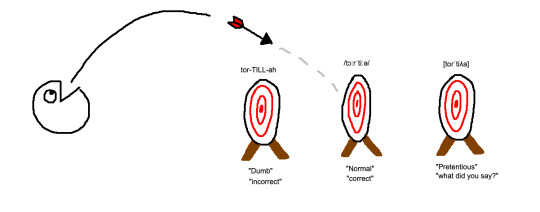#loan words
Text
It’s really amusing to me that Sudoku is a loan word from Japanese that we use.
But in Japan, it’s copyrighted, so they use number place (ナンプレ, I think) which is the English name.
We just traded words :)
#someone correct me if I’m wrong#I’m pretty sure it’s Because of copyright#now I’m not sure if ナンプレ is the commonly used word in conversation or if that’s just what offbrand sudoku uses but either way it’s#interesting to me#language#langblr#Quinn posts#Japanese#loan words#linguistics#English
37 notes
·
View notes
Text
What is the "correct" pronunciation of a loan word?
In English, we often try to attempt the native pronunciation of loan words. And we don’t allow our writing system to control the way we pronounce foreign words. For example, we don’t pronounce “faux pas” as “fowks pass”, and if a friend asked for a “tor-till-ah” instead of “tor-tee-ya”, or “ka-rah-jee” instead of “kara-ah-gee”, you might politely correct them.
In Japanese however, it seems like no such effort is made. Foreign words are transposed into the Japanese writing system, and then read phonetically with seemingly little effort at maintaining the original pronunciation. Muhk-don-aldz becomes ma-ku-don-aru-do; work becomes waa-ku.
In English we know that a Spanish-origin word with two consecutive Ls makes a Y sound. Why then, don’t Japanese people know that you don’t need to pronounce all the extraneous vowels that the Japanese writing system forces into English-origin words? Japanese people certainly use more English loan words than English people use Spanish loan words, so it’s not an issue of familiarity.
I have a theory to expain this phenomenon. First, we have to assume the following things are true:
Some sounds or combinations of sounds that exist in one language don’t exist in many others. This means when a word is borrowed from a different language, the borrowing language often can’t reproduce the pronunciation perfectly as it appears in the native language.
People generally try to pronounce words correctly, as this leads to better communication and understanding, even if this effort is subconscious.
My theory is this, and it applies to any language: the “correct” pronunciation of a loan word is not the native pronunciation. It is actually the pronunciation that gets the closest to the native pronunciation while still only using sounds and combinations of sounds that exist in the language borrowing the word.

I was really satified when I came up with this because it explains a few odd happenings.
It explains why Japanese people make no effort to avoid pronouncing the extraneous vowels they add between consonants in English loan words (because such combinations of sounds simply don’t exist in the Japanese phonetic system).
It explains why people find cooking show hosts pretentious when they suddenly pronounce an ingredient with its native pronunciation, like “parmesan” (because the native pronunciation is “overshooting” - they did not use the agreed upon english pronunciation of the loan word).
It explains why, if I ask a supermarket staff member where the “tofu” is, with perfect Japanese pronunciation, they most likely will not understand me.
That said, my theory may be wrong, and as someone with no formal education in linguistics, I would love it if a real linguist or linguistics student responded to this post with a different opinion or more information!
#linguistics#language#pronunciation#loan words#langblr#language learning#language acquisition#japanese langblr#studyblr
271 notes
·
View notes
Text
Over on Twitter some well informed (I'm being sarcastic) person was telling English speakers that they don't need to know loan words or say them in Japanese.

Don't do that.
Just like loan words in English don't sound like their native pronunciation, loan words in Japanese are pronounced and are still Japanese words.
Can you name loan words that have different meanings than a native English speaker might think? There's more than 2 for sure.
64 notes
·
View notes
Text
Sometimes knowing written Chinese helps with guessing how to write Japanese words.
Sometimes the words are written completely differently, which is completely fine.
But sometimes one radical is switched and that just drives me up the wall
咖啡 = 珈琲
#an oldie but I’ve been seeing 珈琲 a lot more recently and it throws me off#If we could stick to コーヒー we’d all be fine#Japanese#Chinese#loan words#langblr#language learning#Japanese langblr#Chinese langblr#mandarin langblr
5 notes
·
View notes
Note
How did English get so many Latin words ? It’s a Germanic language right?
Hello! Thank you so much for that question and providing enrichment to the tiny linguist in my brain.
English is indeed a Germanic language. It doesn't behave very much like one these days but it's actually kind of Double Germanic because it has it's roots in the Angles, Saxons and Jutes who settled Britain and influence from the Vikings, who tried pillaging the British Isles and then settled there.
Before these groups arrived, the British Isles were a Roman colony (and Celtic before that), which left some influences. The Roman baths in Bath are a physical example. But Latin entered into English in other ways too, especially since Latin wasn't really anyone's first language anymore by the time the Old English started to exist.
Firstly, the ancestor of Old English already had some contact with Latin.
Secondly, Latin was a high prestige language. It's much easier for prestigious languages to influence others (this is why English didn't borrow many words from Celtic languages). Latin was the language of religion and scholarship - the Bible and all church services were in Latin at the time and any educated person would have written and read Latin texts.
Thirdly, some of those words entered English through French. You see, French is a Romance language related to Latin so sometimes it's difficult to know when a word was borrowed at a first glance. But when the Normans took over Britain a lot of Norman French entered the vocabulary (again because as the ruling class they had prestige) and now you have a Double Germanic language with Double Romance influences.
And last but not least some Latin words are more modern. Because Latin and Greek were already high prestige language connected with scholarship they kind of just stayed that way and the West decided that if you're naming something (scientifically) it should be derived from Latin and/or Greek. (shout out to my favourite phenomenon where some plant or animal gets a name and it's a Latin/Greek word followed by the name of a scientist with a Latin suffix attached eg Lophophora Williamsii).
I hope this explanation made sense!
If you want to learn more about Old English you can also check out A History of Early English by Keith Johnson which I have uploaded in my MEGA folder of language resources.
60 notes
·
View notes
Text

Loanword
#loan words#food#tofu#food and drink#wikipedia#wikipedia pictures#loanword#linguistics#language#languages
45 notes
·
View notes
Text
just saw a post about how pronouncing Hawaiʻi in ways other than the native one is morally wrong and racist
and like. do yall understand how loanwords work??? they get. adapted into the respective language with regards to its phonological inventory. English doesnt have a phonemic glottal stop.
the Hawaiian language itself handles loanwords like this, and basically every other language in one way or another, so??? I really dont get the argument.
4 notes
·
View notes
Text
All this time “Ibn” just meant “son”? This is why I like learning languages, it’s like unlocking a secret code that is right there in front of your face waiting to be unlocked.
#similar to when I found out taliban actually means student#language learning#loan words#proper nouns
2 notes
·
View notes
Text
Language and Tribes of Europa
One thing that struck me about the series is the almost deliberate use of Slavic loanwords to lend a different flavor to the English and German generally spoken in the series.
The words can be traced back to actual Slavic terms (on this, more below), but what I also found interesting is that their pronunciation has been modified and affected by two factors:
English orthographical j producing a "dzh" or "zh" type sound, and
Lack of iotation in German removing prefacing /j/ sounds
Thus, the Slavic term boj (prounounced roughly like "buoy") is pronounced, in the series, as "bozh" as though an English speaker saw the word and didn't know its origin. The term itself comes from a word that generally means "fight" in Czech, Serbian and Croatian.
And then we have three words ending in "-nik", which is an imported ending from both Yiddish (itself influenced by Slavic as well as High German) and Russian: "lubovnik", "volnik" and "svobodnik"
Interestingly the root "lubov", clearly drawn from Russian lyubov, does not show the iotation of the original word (so that /ju/ -> /u/), which shows German influence on the loanword "lubovnik", meaning, very loosely, "lover". (I'm purposely being a bit vague here to avoid spoilers, but the context is decidedly not as benign as the word would lead you to believe)
The word "volnik" appears to be generated internally within the German of the Crows by analogy to "lubovnik" and it refers to "person who works with wolk [a drug in the series]". It's not clear to me why the orthographical /v/ of "wolk" has been changed to what would be an orthographical /f/ in "volnik", but that may, ironically, be partial English influence since English does not devoice "V" at the beginning of a word and so "volnik" and "wolk" are pronounced the same phrase-initially.
Svoboda in Czech and Slovenian means, quite ironically, "freedom", so that "svobodnik" means loosely, "free worker". Given that svobodniks don't mine wolk, but rather process it, they're removed from the damaging effects of the raw drug, so in that sense, they are indeed relatively free.
There are some other odds and ends relating to language, but they're mostly one-offs so I won't go into detail about those.
Anyway, these are my linguistic thoughts, let me show you them. :)
#tribes of europa#meta#tribes of europa meta#my thoughts let me show you them#linguistics#languages#loan words#etymology
6 notes
·
View notes
Text
Today's Anglish words:
fellowdom
noun
Socialism.
fellower
noun
Socialist.
#socialism#socialist revolution#democratic socialism#leftism#anglish#old english#english#english language#linguistics#germanic languages#romance languages#loan words#neologisms#etymology
1 note
·
View note
Text
I know people aren't at fault here but damn am I annoyed when people use the loan word leitmofis. Not because of its meaning but because its spelling has been morphed to fit English and it just looks so off to my native German brain.
In German, it is Leitmotiv (singular) or Leitmotive (plural). I get the s plural but why did you fuckers exchange poor v for that lazy sucker f?
#German language#germanblr#english language#loan words#Leitmotiv#Leitmotif#also why hasn't it just been translated?#leading motive would have been completely fine
0 notes
Text
Brand Names in Japanese are FUNNY and CUTE! (and RUDE?)
youtube
1 note
·
View note
Text
I don't want to engage with the terf blog. I don't want to engage with the terf blog. I know that my argument shows just how bad faith their chosen argument is. But it is not worth it.
Whatever. You will never see this random french terf person because I'm about to block your account, but what you're such a language purist that you never use loan words? That's the proof your going to show that gender issues don't exist in the french psyche? Really?
You've never said "football" or "foot" or "parking" or "job" or any of the other English words that have crept into every day French? To the point I got startled when I visited home a few years back and a schoolfriend was telling me all about her "job" instead of her "boulot"?
You don't ever greet people by saying "ciao" like a good two thirds of my school did a decade and a half ago? Do you never say "bye"?
Did you never get asked to do a bit of "baby-sitting" for your neighbours? I sure did.
There are probably more, but I don't spend much time talking in French to people-who-aren't-my-family so I'm not up to date with which English language words are now in everyday use in French language conversations in non franco-british french speakers.
The fact that people use terf, and say "fuck terfs" instead of "allez vous faire foutre, feministe radicale excluant les personnes trans" is because as a rule if there's a shorter way of saying something people will, and everyone knows what fuck and terf means. And similarly people use queer or genderqueer or whichever other term you object too without finding or creating a french equivalent or translating it literally is not proof of some stupid always-online american issue taking over France.
It's proof that people do what they've always done: they use loan words and then those become the word used even when a pre-existing word exists in that language do.
#personal rant#loan words#linguistics#anti-terf#and yes I am responding to a post that was written in french in english - what are you going to do about it?#this is to get it out of my system while I#shout into the void#instead of getting into a stupid online argument#while struggling to remember how to spell in french#because my spelling in french was terrible even before a 15 year hiatus of writing in it on a daily/weekly basis#to only writing in it maybe once or twice a month tops
1 note
·
View note
Text

kampung boy
#superman#clark kent#lois lane#clois#dc comics#jl remix#my art#“kampung” isn't a term exclusively for Malaysians btw! It's meaning can be pretty malleable depending on the SEA country#my parents would refer to areas in the US as a kampung or desa and I think that's the funniest thing#loan words (that sometimes evolve and change meaning) are super common across SEA
416 notes
·
View notes
Text
youtube
This came up on youtube so I was able to relisten and confirm without having to replay the game- Nanami, who famously did not know the english word cow and so did not know that a cowbell is a bell for cows, knows the English word "lesbian". This implies so much.
#nanami kiryuu#juri arisugawa#that moment when nanami realized outing juri would end with her dead#revolutionary girl utena#nev plays the utena game#and yeah she was translating with the#no interest in boys thing#not being redundant#Youtube#lEsBiAN daaaaatte#i mean i'm sure it's a loan word but still. not a common enough one in the 90s she didn't have to translate#apparently.
201 notes
·
View notes
